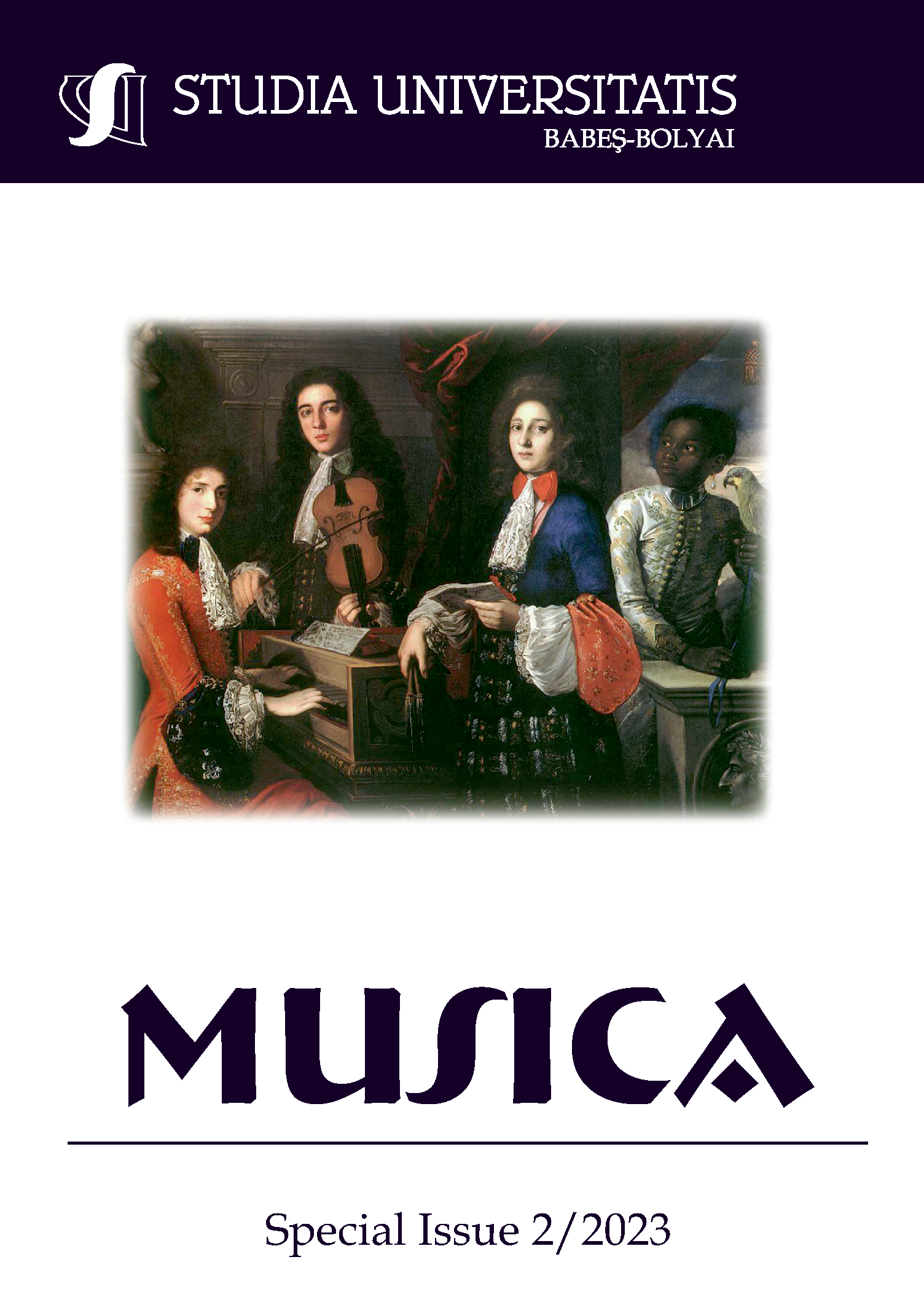VOCAL IMPROVISATION – A COGNITIVE AND A PSYCHOLOGICAL PROCESS
DOI:
https://doi.org/10.24193/subbmusica.2023.spiss2.13Keywords:
vocal improvisation, spontaneous creation, psychological processAbstract
The purpose of this article is to compare the neurophysiological processes of the brain during vocal improvisation and the psychological implications of a spontaneous composition of melody. By taking command of the present, while at the same time bringing forward to the audience an extensive amount of musical knowledge and specific vocal techniques, vocal improvisation is an extensive field of interest for jazz singers and jazz voice educators alike, and its distinct processes are yet to be fully understood and explained. In my years of studying and practicing vocal improvisation, I have sought to understand the balance between these two components – the cognitive and the psychological coordinates of the vocal improvisation and the implications of these coordinates on our everyday life, outside the performing arts frame. The reasons why a singer makes certain musical choices when creating spontaneously, while avoiding others, together with the reasons why improvisation is important in our everyday lives, these reasons make the object of this study.References
Berliner, Paul, Thinking in Jazz: The Infinite Art of Improvisation, Chicago: University of Chicago Press, 1994.
Birge, Edward Bailey, History of Public School Music in The United States, Reston, Music Educators National Conference, 1966.
Blood AJ, Zatorre, Bermudez P, Evans AC, Emotional Responses to Pleasant and Unpleasant Music Correlate With Activity In Paralimbic Brain Regions. Nat Neuroscience 2, pages 382–387, 1999.
Dietrich A., The Cognitive Neuroscience of Creativity. Psychon. Bull Rev 11: P. 1011–1026, 2004.
Engel, Annerose, Peter Keller, The Perception of Musical Spontaneity in Improvised and Imitated Jazz Performances, Frontiers in Psychology, 2011.
Garofalo, Robert. J. Ad Battisti, Frank L., Rehearsing Music: Nonverbal Cues, Body Language, And Facial Expression, 2009.
Haerle, Dan, The Jazz Language: A Theory Text for Jazz Composition and Improvisation, Studio 224, 1980.
Houlahan, Micheal, Tacka, Philip, Kodály today: A cognitive approach to elementary music education, NY: Oxford University Press, 2008.
Hursthouse, Rosalind,On Virtue Ethics. Oxford: Oxford University Press, 1999.
Kernfeld, Barry, "Jazz," The Encyclopedia of New York City, Yale University Press, 1995.
Koelsch S, Fritz T, DY VC, Muller K, Friederici AD, Investigating Emotion with Music: An Fmri Study, 2006.
Limb, Charles J, Braun, Allen R., Neural Substrates of Spontaneous Musical Performance: An Fmri Study of Jazz Improvisation, February 2008.
Livingstone, Steven R., Common Cues to Emotion in The Dynamic Facial Expressions of Speech and Song, 2014.
Madura, Patrice, An exploratory investigation of the assessment of vocal jazz improvisation, Psychology of Music, 23(1), 48-62, 1995.
McPherson,Gary E, Five aspects of musical performance and their correlates, Bulletin of the Council for Research in Music Education, 127, 115-121, 1996.
Nachmanovitch, Stephen, Free Play: The Power of Improvisation in Life and the Arts, Los Angeles, Jeremy P. Tarcher, 1990.
Ozdemir, Elif - Norton, Andrea-Schlaug, Gottfried, Shared and Distinct Neural Correlates of Singing and Speaking. Neuroimage 33: P. 628–635, 2006.
Parker, Chan, My Life in E-Flat, Columbia, S.C.: University of South Carolina Press, 1993.
Schmidt, Katrina, What Is Bright and Warm Singing? 2019.
Steinel, Mike, Building a Jazz Vocabulary: A Resource for Learning Jazz Improvisation, WI: Hal Leonard Corp., 1995.
Waterman, Alan S. Reconsidering Happiness: A Eudaimonist’s Perspective, Journal of Positive Psychology, 3, P. 234–252, 2008.
Woideck, Carl, Charlie Parker: His Music and Life, Anne Arbor: The University of Michigan Press, 1996.
Yehia, Hani C., Kuratate,Takaaki, Vatikiotis-Bateson, Eric, Linking Facial Animation, Head Motion And Speech Acoustics, Journal Of Phonetic, 2002.
Downloads
Published
How to Cite
Issue
Section
License
Copyright (c) 2023 Studia Universitatis Babeș-Bolyai Musica

This work is licensed under a Creative Commons Attribution-NonCommercial-NoDerivatives 4.0 International License.



